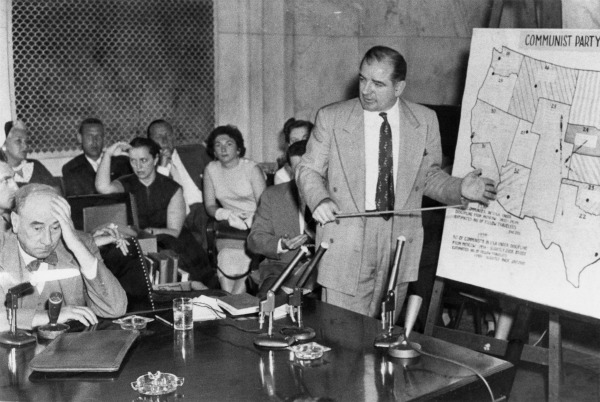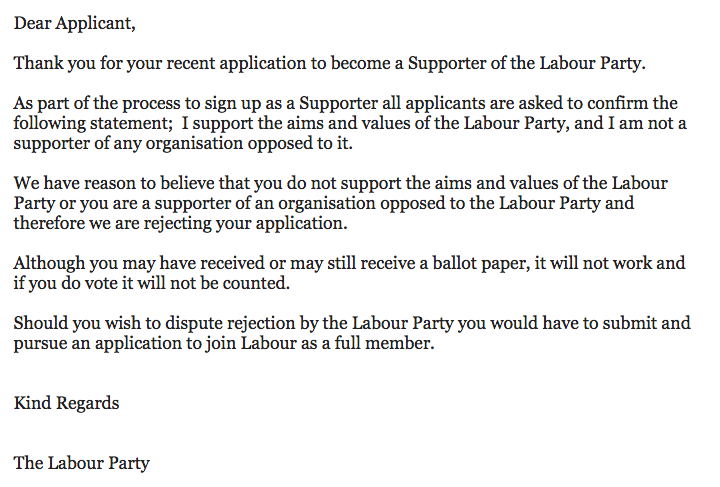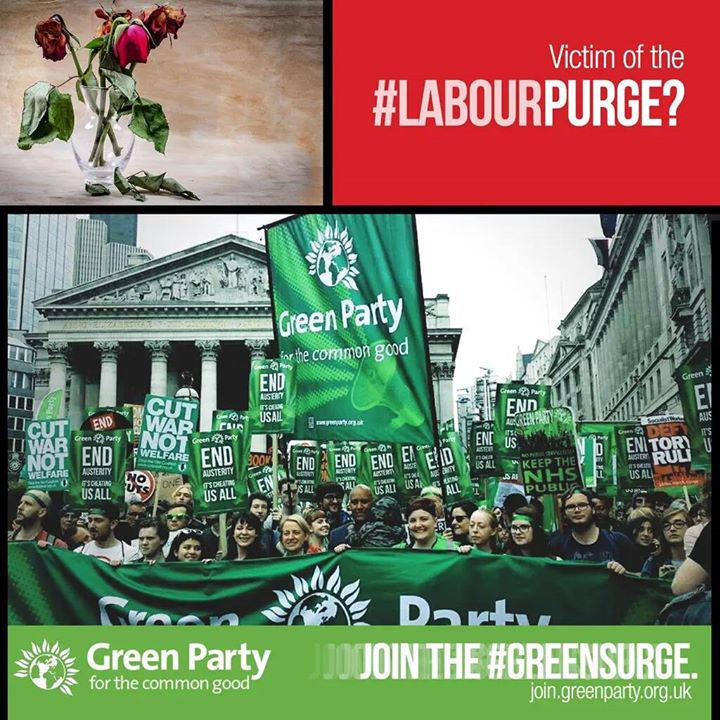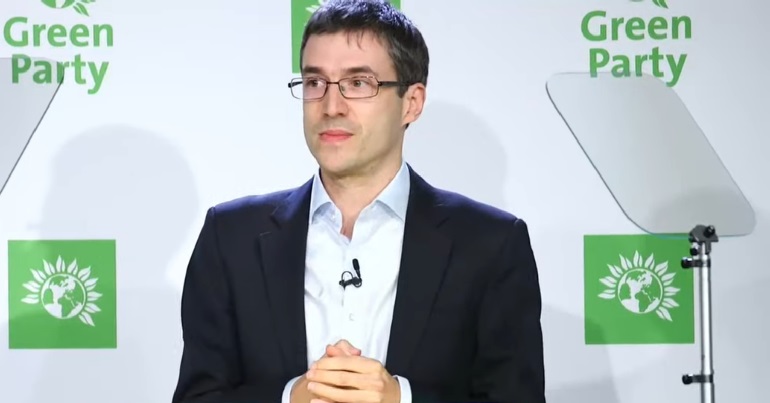The #LabourPurge exposes a Labour Party afraid of democracy

Back in May, acting Labour Party leader Harriet Harman announced that she wanted to ‘let the public in’ to the election for the next leader of the Labour Party, saying that people who were not party members or affiliated supporters would get vote by paying a £3 fee.
She said that ‘Anyone – providing they are on the electoral register – can become a registered supporter, pay £3 and have a vote to decide our next leader. This is the first time a political party in this country has opened up its leadership contest in this way and I think there will be a real appetite for it out there.’
How much has changed since then.
In what has been dubbed the #LabourPurge over social media, the Labour Party is now rejecting huge numbers of applications to become a member, trade union affiliate, or supporter of the party in order to vote in the election. This has extended not only to those who are currently members of other political parties, but to those who are not members of any other party and who are genuine supporters of the Labour Party.
In an article for openDemocracy, Michael Chessum has examined the profiles of some of those individuals whose applications were rejected, concluding that many of these people are ‘are young left wing activists from the student movement and other social movements who joined Labour, enthused by the Corbyn campaign, and had every intention of remaining in the Party’.

It has indeed turned out that there has been ‘a real appetite’ for the Labour leadership to be opened up to ‘let the public in’—just not in the way that Harriet Harman and the other Blairites who came up with this system anticipated.
Jeremy Corbyn’s candidacy has revealed a massive appetite in the British public for a different kind of politics. While the other candidates, with their emphasis on ‘electability’ and their politics of triangulation, Corbyn has, from the start, been clear about where his principles lie, Corbyn has not been afraid to challenge the neoliberal political consensus and the Blairite project of New Labour. Where the other candidates have failed to inspire the imagination of the wider public, Corbyn has set it aflame.
The past several months have been a whirlwind for his campaign. Corbyn has gone from getting the nominations he needed to stand with minutes to spare, to becoming the clear front-runner in the race. The most recent poll has predicted a landslide victory for him with 57% of the first-preference votes, and he has spoken at rallies attended by thousands across the country. A large portion of the 400,000 new sign-ups to the Labour Party can be ascribed to this ‘Corbynmania’, as hundreds of thousands of activists and members of affiliated trade unions (who would have automatically had a vote under the previous electoral system) have signed up for a vote after being inspired by his campaign.
This has left the Blairite right within the Labour Party more and more desperate. After wheeling out figures from Tony Blair himself to Neil Kinnock to Gordon Brown to publicly oppose Corbyn’s campaign has found little success, the #LabourPurge must surely be a last ditch attempt by the Labour elite to determine the outcome of the election. Those at the top of the Labour Party have initiated a witch-hunt among those who have signed up to vote and rejecting their application, in many cases on completely unsubstantiated grounds. This has included, it seems, trawling through social media posts or canvassing returns to find people who have previously been critical of the Labour Party in the past or who have voted for other parties in previous elections.
The Labour Party should be welcoming these 400,000 new members and supporters as something exciting, the emergence of a popular mass movement and an upsurge in democratic engagement. The fact that they instead see them as infiltrators highlights a growing chasm between the top of the Labour Party and its grassroots, with the top running scared of a democratic contest that is headed in a direction they do not want to see. This is not at all a sustainable situation, and something has to give. Whether the grassroots of the Labour Party or the Blairites at the top ultimately win out is far from certain, but what seems definite is that even in the case of a Corbyn victory, the struggle is far from over. For decades the Labour Party has been reshaped to limit democratic participation in its decisions. That is hardly something that will change overnight.

While there is much to celebrate in comparing the internal democracy of the Green Party with that of Labour, with all of our policies democratically determined by members at conference, this #LabourPurge can also serve as a cautionary tale for Greens. With any political organisation, there is always the risk that the leadership can become disconnected from the grassroots membership, and that is something we will need to watch out for as the Green Party continues to grows, ensuring that the leadership can always be held accountable by members.
Additionally, the #GreenSurge has brought similar questions to the Greens as those Labour now faces. This has included discussion over whether to welcome new members with open hands, or caution as to whether we needed to ensure they truly believed in the values of the Green Party to prevent them from somehow subverting the party. Thankfully, the former option was the one pursued, although there are still limits to the involvement of new members in the party, and certainly some unease by what is now the minority of people who have been members for more than a year.
Most significantly, in the case of the Green Party of England and Wales, people can only stand for election to the Green Party Executive Council (GPEx) if they have been a member for two years, and they can stand for Leader or Deputy Leader if they have been members for 3 years. In order to allow new members (who now form the majority of the party) the full opportunity to be involved in the Party on an equal basis to people who have been members for a longer period of time, this will have to change.




Apologies for rampant typo’s!
Perhaps what is being hinted at is , in the case of defections, a new member with some experience in party positions or in council dests could be an asset. Certainly the many candidates who stood for GPRW, both locally and in the GE, were not always as well acclimatised as would be desirable (IMO). In my own ward i was cautious about a young candidate fresh out from doing a Politics degree. That person may have been a highly credible candidate but it was difficult for me to assess. In the event of the Blairites maintaing undemocratic control of their Party, the possibility of experienced defectors is likely and our rules may have to be reviewed. Perhaps local parties should be able to vote on a case by case basis?
Perhapd what is being hinted at is , in the case of defections, a new member with some experience in party positions or in council dests could be an asset. Certainly the many candidates who stood for GPRW, both locally and in the GE, were not always as well acclimatised as would be desirable (IMO). In my own ward i was cautious about a young candidate fresh out from doing a Politics degree. That person may have been a highly credible candidate but it was difficult for me to assess. In the event of the Blairites maintaing undemocratic control of their Party, the possibility of experienced defectors is likely and our rules may have to be reviewed. Perhaps local parties should be able to vote on a case by case basis?
The Green Party has had its own panics about infiltration in the past.
the rules on length of membership are good ones